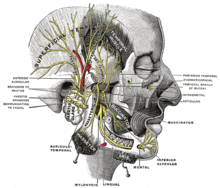Etymology
- Greek word παÏωτῖτις (νόσος) means 'disease of the parotid gland'
- παÏωτίς (stem παÏωτιδ-) means 'gland behind the ear'
- οὖς (stem á½ Ï„-, Åt-) means 'ear'
- παÏά - pará means 'behind'
- Etymology of the term parotitis is derived from Greek words related to the location and gland involved
Causes
- Dehydration can be a non-infectious cause of parotitis, especially in elderly individuals or after surgery
- Acute bacterial parotitis is often caused by Staphylococcus aureus or other commensal bacteria
- Parotitis can also be caused by extrapulmonary tuberculosis, with symptoms including cough, fever, weight loss, and chest pain
- Mumps, caused by Paramyxovirus, is a common viral cause of parotitis
- HIV infection can lead to parotitis, often associated with generalised lymphadenopathy and dry mouth
Autoimmune causes
- Sjögren's syndrome is an autoimmune disease characterised by chronic inflammation of the salivary glands, including the parotid gland
- Lymphoepithelial lesion of Godwin is a tumor associated with Sjögren's syndrome
- Chronic autoimmune parotitis, also known as chronic punctate parotitis, is a group of autoimmune causes of parotitis
- The prevalence of parotitis in women with Sjögren's syndrome is approximately 9 times higher than in men
- The cause of autoimmune parotitis is unknown, but it is often accompanied by excessive dryness in various parts of the body
Blockage
- Acute parotitis can be caused by blockage of the main parotid duct or its branches
- Blockage may be due to salivary stones, mucous plugs, or rarely, tumors
- Salivary stones, also known as sialolithiasis, are mainly composed of calcium
- Duct stricture, infection, or injury can also cause blockage and inflammation of the parotid gland
- Symptoms of blockage may include recurrent swelling, pain, and aggravation during eating
Diseases of uncertain cause
- Chronic nonspecific parotitis refers to cases where no definite cause is found
- Recurrent parotitis of childhood, also known as juvenile recurrent parotitis (JRP), is a syndrome characterised by recurring episodes similar to mumps
- Sialadenosis, or sialosis, is a disorder where both parotid glands are diffusely enlarged with modest symptoms
- Sarcoidosis, a systemic disease, can also affect the salivary glands in approximately 10% of cases
- The cause of these diseases is uncertain, and they may have various associated factors such as endocrine disorders or drug use.
Parotitis is an inflammation of one or both parotid glands, the major salivary glands located on either side of the face, in humans. The parotid gland is the salivary gland most commonly affected by inflammation.
| Parotitis | |
|---|---|
 | |
| Parotid gland (center left) | |
| Specialty | Infectious diseases |